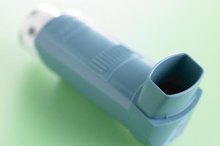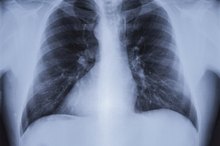Mucinex is an over-the-counter medication used to treat cough and chest congestion associated with a cold. The active ingredient in Mucinex is an expectorant called guaifenesin 2. Guaifenesin works to help loosen and thin mucous secretions in the chest in order to remove the congestion through coughing 2. The medication may cause side effects such as nausea, vomiting and a headache, according to MedlinePlus 2. Individuals need to consult with a physician or pharmacist before taking any medications.
If you are experiencing serious medical symptoms, seek emergency treatment immediately.
Not for Pediatric Use
Children under the age of 12 should not take Mucinex. The manufacturer, Reckitt Benckiser, produces a Mucinex product designed specifically for children, with proper dosages. Children under the age of four should not take cough or cold products without a physician’s order, according to Drugs.com 14.
Use Cautiously with other Lung Conditions
How Does Mucinex Work?
Learn More
Lung conditions such as asthma or chronic bronchitis may worsen while taking Mucinex. Smokers or individuals who have large amounts of mucus when coughing should consult a physician before taking Mucinex to avoid breathing problems.
Name Confusion
Some individuals may confuse the name of medications with similar sounding names or with similar spelled names. Mucinex and the medication Mucomyst may become confused for some people, according to the Institute for Safe Medication Practices 34. Mucomyst is a liquid medication administered as an inhalant to treat serious lung conditions such as cystic fibrosis, emphysema and bronchitis 4.
Dietary Precautions
Side Effects Of Mucinex DM Cough Suppressant
Learn More
Individuals using Mucinex need to increase fluid intake while taking this medication. The increased amount of fluids will help keep the secretions in the chest thin so the affected individual can cough up mucus easier.
Pregnancy and Breastfeeding
Women who are pregnant or breastfeeding need to consult a physician before taking Mucinex. Guaifenesin may harm a developing baby 2. The medication may place the baby at a higher risk of developing an inguinal hernia, according to BabyCenter LLC.
Discontinue Use
For side effects that become bothersome, individuals need to stop taking the medication and consult a physician. These symptoms may indicate a more serious medical condition that requires additional treatment.
Related Articles
References
- MedlinePlus: Guaifenesin
- Institute for Safe Medication Practices: ISMP's List of Confused Drug Names
- Drugs.com: Mucomyst
- Guaifenesin. Drugs.com website. Updated November 14, 2010.
- Guaifenesin. Medline Plus website. Updated July 15, 2017.
- Guaifenesin (Oral Route). PubMed Health website. Updated October 1, 2017.
- Rubin, BK. (2017). Mucolytics, Expectorants, and Mucokinetic Medications. Respiratory Care. 52:7, 859.
Writer Bio
Abigail Adams began her freelance writing career in 2009, teaching others about medical conditions and promoting wellness by writing on online health and fitness publications. She is educated and licensed as a registered nurse, having received her degree from North Georgia College and State University.









